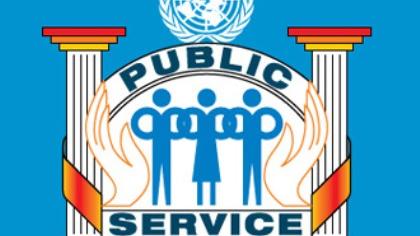24 June 2015 - The United Nations Public Service Day was celebrated on 23 June under the theme "Innovating the Public Service to implement the post-2015 Development Agenda". The day aims to celebrate the value and virtue of service to the community and promote innovation, enhance professionalism and visibility of public service.The United Nations recognizes that democracy and successful governance are built on a competent civil service.
No country or government works without its civil servants, responsible for the various services available to the citizen. It is therefore of paramount importance to recognize the service they provide to society, and not forget that serve the population with quality and dedication should always be the goal and the aim of all servers.
In Guinea-Bissau it is common to hear complaints about the care in hospitals or other public services. Long lines, excessive bureaucracy and poor quality of services have prevented a considerable number of people to fully use the public service.
The project of administrative reform of United Nations Development Programme, (PNUD) finances since 2008 the national project of public administration reform, modernization and decentralization of services.
The coordinator of the project, Aquino António Duarte, said that since years UNDP has been supporting the Ministry of Civil Service with its reform program, as there is a lack of technical and financial capacity in this area.
According to the nurse in the emergencies service at the National Hospital Simão Mendes (the main hospital in the country), Paula Ema Albino, the responsiveness does not correspond to the demands of the emergency service. Moreover, according to her there is a lack of awareness of citizens about the nature of the emergency service that creates dissatisfaction of the population with health professionals.
The coordinator of the coordinating unit of the reform and innovation of the administrative reform in the Ministry of Civil Service of Guinea-Bissau, Jose Braima Dafé, recalls that the level for the development of any country depends on the strong appreciation of its human capital.
According to Braima Dafé, since the 90s, a series of reforms were carried out, including legislative reforms. "Several sets of laws in the field of public administration were discussed, approved, promulgated and published, which means that today many laws governing public administration correspond to the current context of the country. Right now we are in the recovery phase and we are heading towards decentralization that will culminate in the establishment of local authorities. In the initial phase we selected three pilot regions (Gabu, Quinara and Cacheu) to install regional offices in order to facilitate and familiarize people on decentralization and local authorities", added Dafé.
Finally Dafé remembered that "you cannot think of development without good governance. Good management means good governance; there must be good specialists, specialists with organized mentality, with high sense of responsibility, with high statesmanship, because a country without a strong administration is overrun by corruption".
No country or government works without its civil servants, responsible for the various services available to the citizen. It is therefore of paramount importance to recognize the service they provide to society, and not forget that serve the population with quality and dedication should always be the goal and the aim of all servers.
In Guinea-Bissau it is common to hear complaints about the care in hospitals or other public services. Long lines, excessive bureaucracy and poor quality of services have prevented a considerable number of people to fully use the public service.
The project of administrative reform of United Nations Development Programme, (PNUD) finances since 2008 the national project of public administration reform, modernization and decentralization of services.
The coordinator of the project, Aquino António Duarte, said that since years UNDP has been supporting the Ministry of Civil Service with its reform program, as there is a lack of technical and financial capacity in this area.
According to the nurse in the emergencies service at the National Hospital Simão Mendes (the main hospital in the country), Paula Ema Albino, the responsiveness does not correspond to the demands of the emergency service. Moreover, according to her there is a lack of awareness of citizens about the nature of the emergency service that creates dissatisfaction of the population with health professionals.
The coordinator of the coordinating unit of the reform and innovation of the administrative reform in the Ministry of Civil Service of Guinea-Bissau, Jose Braima Dafé, recalls that the level for the development of any country depends on the strong appreciation of its human capital.
According to Braima Dafé, since the 90s, a series of reforms were carried out, including legislative reforms. "Several sets of laws in the field of public administration were discussed, approved, promulgated and published, which means that today many laws governing public administration correspond to the current context of the country. Right now we are in the recovery phase and we are heading towards decentralization that will culminate in the establishment of local authorities. In the initial phase we selected three pilot regions (Gabu, Quinara and Cacheu) to install regional offices in order to facilitate and familiarize people on decentralization and local authorities", added Dafé.
Finally Dafé remembered that "you cannot think of development without good governance. Good management means good governance; there must be good specialists, specialists with organized mentality, with high sense of responsibility, with high statesmanship, because a country without a strong administration is overrun by corruption".






